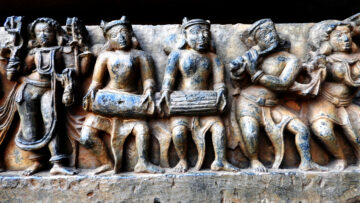In this paper I explore the extent to which the dialectical approach of Śrīharṣa can be identified as skeptical, and whether or how his approach resembles that of the first century Mādhyamika philosopher Nāgārjuna. In so doing, I will be primarily reading the first argument found in Śrīharṣa’s masterpiece, the Khaṇḍana-khaṇḍa-khādya (KhKh). This argument grounds the position that the system of justification (pramāṇa) that validates our cognition to be true is not outside of inquiry.[1] Closely adopting Śrīharṣa’s polemical style, I am neither proposing a thesis in this paper that Śrīharṣa is a skeptic, nor am I denying such a possibility. I believe we can pursue our arguments on a neutral ground and let the facts speak for themselves. Although my aim is not to write a history of skepticism or compose a chapter on comparative philosophy, I will nonetheless outline salient features that define skepticism in the mainstream philosophical discourse so that analyzing Śrīharṣa’s first argument becomes easier.[2] In so doing, I will introduce some of the arguments of Nāgārjuna in light of Śrīharṣa’s position. This comparison, however, is restricted only to the salient features relevant to further the central argument of this paper and is therefore not aimed to encompass the overall positions of these two giants.
Preliminary Remarks
Śrīharṣa is one of the most prominent Advaita philosophers from classical India. He is known at home and in the West in two different ways: traditionally, he follows the Advaita system and his arguments are read to buttress the non-dualism of the Brahman, rejecting the Nyāya realist categories that include both metaphysical categories and the epistemic system that validates these categories. While he is hardly a prominent figure in the West, whatever marginal study has emerged has assigned him a position of skepticism or non-realism. While his approach broadly resembles that of Nāgārjuna, and his work is highly regarded in the Advaita circle, his contribution to philosophical inquiry is yet to be fully explored. And this is a generational project, impossible to articulate in this small chapter. I have therefore limited myself to examination of only the first argument that primarily relates to the issue of virtue argumentation, and I will briefly mention some other arguments to make a broader comparative analysis.
Scholars have demonstrated a great hesitation to align the philosophy of Śrīharṣa with skepticism, and this is partly due to the opaqueness of the term itself. ‘Skepticism’ is invoked to prove or reject all kinds of arguments, and to label different types of philosophies. Although we are not living in the era of Giordano Bruno, most of us would still not prefer to wear the hat of skepticism. Many of the arguments of Śrīharṣa, and for that matter his Buddhist predecessor Nāgārjuna, can be identified as skeptical, particularly their approach to reasoning and their openness to question not just beliefs but also the very system of justification. In essence, the very rationality that grounds truth also leads to the suspension of all forms of judgment, including the very reliance on the system that establishes the sense of validity. Just like semantic or epistemic externalism responds to some of the skeptical arguments in the West, the Nyāya and Mīmāṃsā schools developed their epistemology and philosophy of language to counter many of the arguments of Nāgārjuna or Śrīharṣa.
If skepticism is a thesis, Śrīharṣa is certainly not interested in establishing it. And if a precondition for one to be a skeptic is to maintain that knowledge is not possible, Śrīharṣa does not fall in this category either. He is simply interested in openness, not just about the categories for their reliance on system of justification, but also in the very system that confirms the existence of those categories and establishes truth claims. This radical openness is by no means original to Śrīharṣa, as he comes in a chain of philosophers such as Nāgārjuna or Jayarāśi. Srīharṣa does not initiate his discourse with the premise of doubt, and although he questions not just beliefs but also the system of judgment that justifies beliefs, he does not conclude that knowledge is impossible.
It does not take a skeptic to make the claim that our cognition does not always correspond to truth, or that our epistemic system is not free of flaws. If propositions are verified by our knowledge, an issue emerges, what is it that verifies knowledge? The fundamental divide in the Western tradition regarding knowledge is summed up in the tendencies that our knowledge is based on experience (empiricism), or on reason (rationalism). Some of the skeptical questions of our times are a direct consequence of the exchange between these two traditions with the issue at the center being whether reason or experience or both in some shared way give us veridical knowledge. Indian philosophical systems have never faced a serious chasm between empirical and rational analytical tendencies. For this reason, the ways skeptical arguments have evolved in the contemporary West have a very limited relevance, if our quest is to understand the philosophical underpinnings of the classical India. This is to say that the skeptical arguments derived from the central premise that impressions may not sufficiently explain our experience (Carneade or Hume) or the premise that epistemic systems beg their own justification (Sextus Empiricus) do not divide Indian philosophical schools. If we use the label of skepticism for describing the philosophies of these two giants, we need to keep these central premises in mind.
The three philosophers from classical India often cited for maintaining some form of skepticism, Nāgārjuna, Jayarāśi, and Śrīharṣa, come from three different schools: Madhyamaka Buddhism, Cārvāka materialism, and Advaita Vedanta. These philosophers have developed unique methods of their own for a dialectical practice. The prasaṅga or reductio ad absurdum arguments of Nāgārjuna lead his opponents to absurdity in accepting any of the possible alternatives. While he questions both the epistemic system and the categories themselves when adopting the reductive arguments, his philosophy is always grounded on the emptiness of the essential nature (śūnyatā). Jayarāśi questions both the categories and the system of justification, with an intent to support some form of hedonism. Śrīharṣa’s skepticism also has similar limits, with him questioning all the categories to eventually return to the foundational consciousness identical to the self or the Brahman. Although these philosophers have different motives, this does not preclude them from sharing similar argumentation. If the objective of skepticism is to demonstrate that knowledge is impossible, then surely these are not the philosophers to be in this camp. These philosophers, however, question our epistemic system and the dialectical process that examines the categories from different angles. Rather than abandoning reason altogether, these philosophers demand that reason itself deserves the same scrutiny that it applies to examining the categories.
[1] Pramāṇa stands for means of cognition, or the instruments that make a cognitive event possible. Pramāṇas are also the systems by which we validate certain knowledge claims. The project at hand is not epistemic one in analyzing how we cognize but rather how a certain knowledge claim is justified. Therefore I have understood pramāṇa in this paper as a system of justification. For further discussion on pramāṇa, see Monanty 1966.
[2] Ram-Prasad (1993; 2002, 133-200) has examined this argument in the context of analyzing sattā and bhāva. Also read Granoff 1978.
The paper was first published in The Journal of Indian Philosophy (2016) 45:313–329 2014;7:6–24 and has been republished with author’s permission.
Featured Image: Reasonable Faith
(This article was published by IndiaFacts in 2019)
Disclaimer: The opinions expressed in this article belong to the author. Indic Today is neither responsible nor liable for the accuracy, completeness, suitability, or validity of any information in the article.










